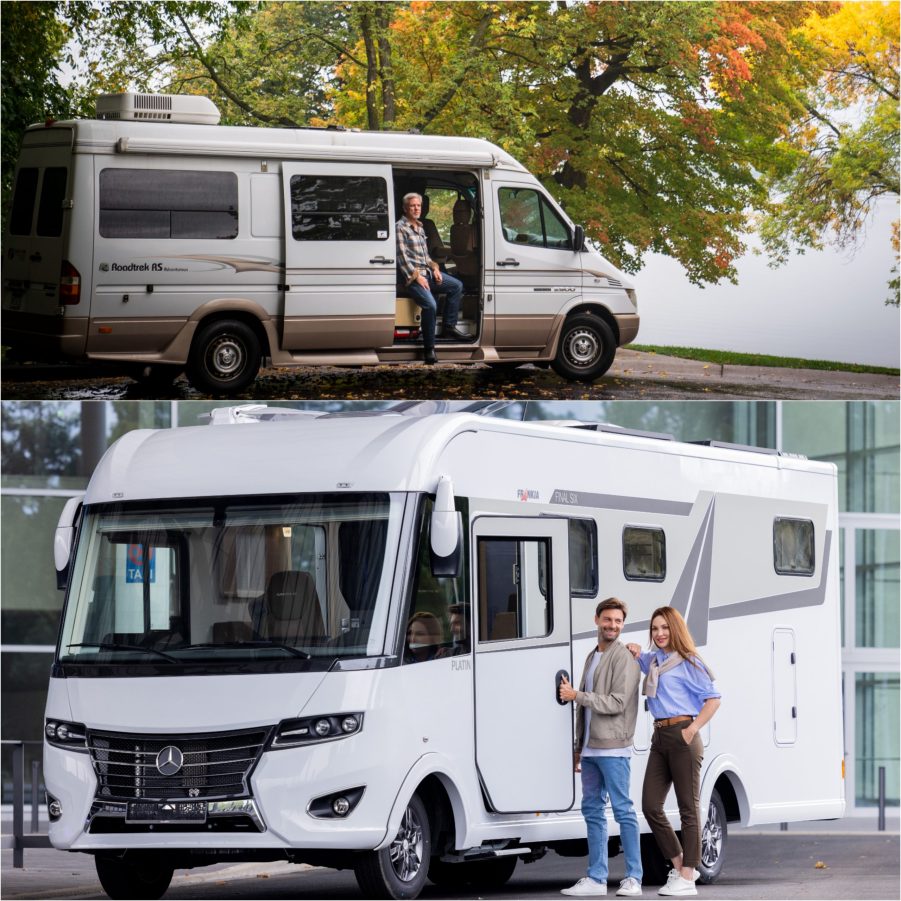
Which Is Better: a Camper Van With Good Fuel Economy, or a Class A RV With a Massive Gas Tank?
Typically, an RV or camper van isn’t praised for its fuel economy. But after learning about the most efficient camper van available, I thought about the question of economical RVs from a different angle. It’s one thing to have an engine that sips fuel, but if the vehicle is small, so is the gas tank. Therefore, is it actually better to have a camper van with good fuel economy? Or would a gas-guzzling class A RV with a big engine beat out the camper?

The most fuel-efficient camper van model is the Winnebago Travato
Rated at around 22 miles per gallon in ideal conditions, the Winnebago Travato is the most economical new camper van model available. That doesn’t mean it’s the most fuel-efficient recreational vehicle, as you could technically make a camper van out of your car. But from the factory, the Winnebago takes the cake.
On top of that, the Travato camper van has a 24-gallon gas tank. Do the math, and that’s 528 miles every fill-up. And it’s not like the Winnebago sacrifices anything major. You still have a compact bathroom, a kitchenette, and seating for four.
But there’s a saying amongst RV enthusiasts. In order to make the lifestyle work, you either have to have a lot of love, or a lot of space. And when it comes to full-sized Class A RVs, you can’t get much bigger, or much thirstier.
The American Eagle is fitted with a gargantuan 150 gallon tank, but is it enough?
The American Coach Eagle RV is the size of a bus, weighing in at 51,000 lbs. It’s nearly 45 feet long and 105 inches wide. But it has every possible amenity you’d want, without sacrificing space. There’s a 64-inch loveseat and an 80-inch couch (that converts to a bed). And that doesn’t include the king-sized bed in the sleeping area. And the bathroom is big enough for more than one person at a time, unlike the clever camper van bathroom solutions.
And underneath the impressive interior is a 150-gallon gas tank. For comparison, most semi-trucks are packing 200 gallons of gas, so for a civilian vehicle that’s rather excessive. And so is the 605 horsepower and 1950 lb-ft of torque from the Cummins XIS50 diesel engine. But because of all the features, and its incredible weight, the American Eagle’s fuel economy takes a massive hit.
Obviously, fuel economy isn’t a selling point for large RVs like this, so no sites really list it. But the ballpark estimate amongst owners is that the American Eagle gets six miles per gallon. And yet, even with that dismal fuel economy, that’s 900 miles of range on a single tank.
That said, the tank is expensive to fill. If you assume diesel is $3 (which is a very low assumption), then you have to fork over $450 every time you run out of gas. With that said, only one question remains: which is right for you?
Are you better off with a Class A RV or a fuel-efficient camper van model?

Obviously, I’m using two polar opposites for this example. But in general, the Winnebago Travato will have the same strengths and weaknesses as any other camper van. Meanwhile, the American Eagle will have the same pros and cons of any other Class A RV.
The main factor you need to consider is price. If you don’t want to spend $450 every time you fill up (or almost a million bucks to buy the American Eagle RV in the first place) then chances are, you want a camper van. However, if you want the space and added luxuries, then a Class A RV might be right for you.
Or, you could meet in the middle, with a Class C RV. Sure, the build quality might not be as great, but the price will be lower. And on top of that, you’ll get a full kitchen, bathroom, and bedroom. And a Class C RV can make for a bearable road trip, unlike a camper van, with plenty of room for all your passengers.
At the end of the day, there’s no such thing as an economical RV. You’re going to spend a lot of money, and you’re going to use a lot of gas. But you don’t buy an RV because it’s cheap, you buy one because of the memories you’ll make along the way.


